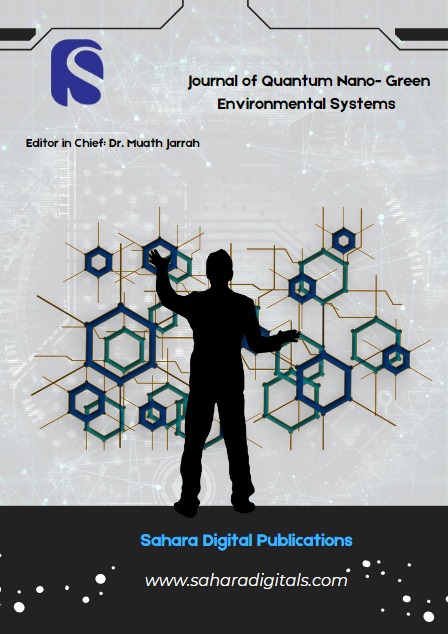Title: ARTIFICIAL NEURAL NETWORKS FOR MODELLING AND SIMULATING QUANTUM PHENOMENA IN ECO-FRIENDLY GREEN ENVIRONMENTAL TECHNOLOGIES

Journal of Quantum Nano- Green Environmental Systems (QNGES)
© by QNGES - Sahara Digital Publications
ISSN: 3079-6210
Volume 01, Issue 01
Year of Publication : 2025
Page: [46 - 54]
Authors :
Norul Fadzil and Adnan Subir
Address :
Electrical and Computer Engineering Dept., College of Engineering, University of Duhok, Iraq
Division of Research and Development, Lovely Professional University, Phagwara, India
Abstract :
Slow global warming, protecting our planet's natural resources, and environmentally conscious green technology are increasingly essential in the fight for sustainable development. This project aims to use ANNs, especially PINNs, to describe and simulate quantum events that affect the efficiency of renewable energy sources like wind and solar power. PINNs excel at this because they may include physical rules that regulate environmental processes; hence, they are perfect for datasets that include meteorological variables such as temperature, wind speed, sun radiation, and other similar variables. Forecasting how renewable energy systems would act in different scenarios, the technique entails training PINN-EcoQuantumNet on a sizeable environmental dataset that includes time series data on sun intensity, wind patterns, and temperature variations. Important results demonstrate that by including physical restrictions, Physics-Informed Neural Networks (PINNs) increase the accuracy of predictions and programmes' capacity to represent dynamic processes controlled by quantum mechanics. Possible innovations in environmentally conscious technologies can also be better understood using data collected from client records. Since PINNs that accurately portray complicated quantum and ecological interactions, scientists have concluded that they constitute a useful tool for promoting creativity in the preservation of the environment.
Keywords :
Physics-Informed Neural Networks, quantum phenomena, meteorological data, efficiency of green technologies, renewable energy systems
